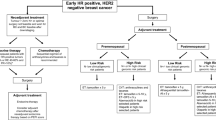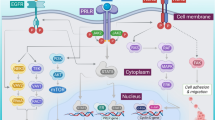Abstract
Background
Patients with estrogen-independent (ERneg) human epidermal growth factor receptor-2 (HER-2)-positive ductal carcinoma in situ (DCIS) treated with lumpectomy alone or lumpectomy and radiation are at increased risk of developing subsequent breast cancer events.
Methods
Thirty-eight patients with HER-2 expressing DCIS received a HER-2 pulsed autologous dendritic cell (DC1) vaccine administered over 4–6 weeks before surgical resection. HER-2 and estrogen receptor (ER) expression were determined by immunohistochemistry. In 35 patients, CD4pos T-cell sensitization to HER-2 peptides was identified by ELISPOT. In 19 patients, CD8pos T-cell responses were identified by ELISA. Clinical and immune responses postvaccination were compared between intermediate-expressing HER-2 (2+) and high-expressing HER-2 (3+) patients, as well as ERneg and estrogen-dependent (ERpos) patients.
Results
There was no significant difference in immune response after HER-2 vaccination in patients with HER-2 (2+) and (3+) tumors or ERneg and ERpos tumors. Complete tumor regression rates were similar in patients with HER-2 (2+) and (3+) DCIS. Overall, clinical response rates were similar in patients with ERneg and ERpos DCIS, but complete tumor regression was significantly more common in patients with ERneg DCIS.
Conclusions
Despite equivalent immune responses after vaccination in patients with HER-2 (2+), HER-2 (3+), ERneg and ERpos DCIS, HER-2 pulsed DC1 induces more complete responses in patients with ERneg DCIS. These data provide a rationale for developing vaccinations to reduce recurrence in patients with ERneg DCIS for whom there are currently limited adjuvant options.



Similar content being viewed by others
References
Smigal C, Jemal A, Ward E, Cokkinides V, Smith R, Howe H, Thun M. Trends in breast cancer by race and ethnicity: update 2006. CA Cancer J Clin. 2006;56(3):168–83.
Wang GS, Zhu H, Bi SJ. Pathological features and prognosis of different molecular subtypes of breast cancer. Mol Med Report. 2012;6(4);779–82.
Koski G, Koldovsky U, Xu S, et al. A novel dendritic cell based immunization approach for the induction of durable Th1-polarized anti-HER-2/neu responses in women with early breast cancer. J Immunother. 2012;35(1):54–65.
Sharma A, Koldovsky U, Xu S, et al. (2012), HER-2 pulsed dendritic cell vaccine can eliminate HER-2 expression and impact ductal carcinoma in situ. Cancer. 2012;118(17):4354–4362.
Czerniecki B, Koski G, Koldovsky U, et al. Targeting HER-2/neu in early breast cancer development using dendritic cells with staged interleukin-12 burst secretion. Cancer Res. 2007;67:1842–1852.
Benavides LC, Gates JD, Carmichael MG, et al. The impact of HER2/neu expression level on response to the E75 vaccine: from U.S. Military Cancer Institute Clinical Trials Group Study I-01 and I-02. Clin Cancer Res. 2009;15(8):2895–2904.
Mittendorf EA, Clifton GT, Holmes JP, et al. Clinical trial results of the HER-2/neu (E75) vaccine to prevent breast cancer recurrence in high-risk patients. Cancer. 2012;118(10):2594–2602.
Hackshaw A, Roughton M, Forsyth S, et al. Long-term benefits of 5 years of tamoxifen: 10-year follow-up of a large randomized trial in women at least 50 years of age with early breast cancer. J Clin Oncol. 2011;29(13):1657–1663.
O’Brien KM, Cole SR, Tse CK, et al. Intrinsic breast tumor subtypes, race, and long-term survival in the Carolina Breast Cancer Study. Clin Cancer Res. 2010;16:6100.
Bedrosian I, Mick R, Xu S, et al. Intranodal administration of peptide pulsed mature dendritic cell vaccines results in superior CD8 + T-cell function in melanoma patients. J Clin Oncol. 2003;21(20):3826–3835.
Xu S, Koski G, Faries M, et al. Rapid high efficiency sensitization of CD8 + T cells to tumor antigens by dendritic cells leads to enhanced functional avidity and direct tumor recognition through an IL-12 dependent mechanism. J Immunol. 2003;171(5):2251–2261.
Kobayashi H, Wood M, Song Y, et al. Defining promiscuous MHC class II helper T cell epitopes for the HER-2/neu tumor antigen. Cancer Res. 2000;60:5228–5236.
Knutson K, Schiffman K, Cheever M, et al. Immunization of cancer patients with a HER-2/neu, HLA-A2 peptide, p369–377, results in short-lived peptide specific immunity. Clin Cancer Res. 2002;8:1014–1018.
Roses R, Paulson E, Sharma A, et al. HER-2/neu overexpression as a predictor for the transition from in situ to invasive breast cancer. Cancer Epidemiol Biomarkers Prev. 2009;18:1386–1389.
Rosenberg SA, Yang JC, Restifo NP. Cancer immunotherapy: moving beyond current vaccines. Nat Med. 2004;10:909–915.
Palucka K, Ueno H, Banchereau J. Recent developments in cancer vaccines. J Immunol. 2011;186(3):1325–1331.
Cintolo JA, Datta J, Mathew SJ, Czerniecki BJ. Dendritic cell-based vaccines: barriers and opportunities. Future Oncol. 2012;8(10):1273–1299.
Keilholz U, Martus P, Scheibenbogen C. Immune monitoring of T-cell responses in cancer vaccine development. Clin Cancer Res. 2006;12:2346s–2352s.
Harada S, Mick R, Roses RE. The significance of HER-2/neu receptor positivity and immunophenotype in ductal carcinoma in situ with early invasive disease. J Surg Oncol. 2011;104:458–465.
Ithimakin S, Day KC, Malik F, et al. HER-2 drives luminal breast cancer stem cells in the absence of HER-2 amplification: implications for efficacy of adjuvant trastuzumab. Cancer Res. 2013;73(5):1635–1646.
Nahta R, O’Regan RM. Therapeutic implications of estrogen receptor signaling in HER2-positive breast cancers. Breast Cancer Res Treat. 2012;135:39–48.
Sabnis G, Schayowitz A, Goloubeva O, Macedo L, Brodie A. Trastuzumab reverses letrozole resistance and amplifies the sensitivity of breast cancer cells to estrogen. Cancer Res. 2009;69:1416–1428.
Xia W, Bacus S, Hegde P, et al. A model of acquired autoresistance to a potent ErbB2 tyrosine kinase inhibitor and a therapeutic strategy to prevent its onset in breast cancer. Proc Breast Cancer Res Treat. 2006;103(20):7795–7800.
Mittendorf EA, Wu Y, Scaltriti M, et al. Loss of HER2 amplification following trastuzumab-based neoadjuvant systemic therapy and survival outcomes. Clin Cancer Res. 2009;15:7381-8.
Disclosure
Dr. Czerniecki has licensing agreement with Immunocellular Therapeutics.
Author information
Authors and Affiliations
Corresponding author
Rights and permissions
About this article
Cite this article
Fracol, M., Xu, S., Mick, R. et al. Response to HER-2 Pulsed DC1 Vaccines is Predicted by Both HER-2 and Estrogen Receptor Expression in DCIS. Ann Surg Oncol 20, 3233–3239 (2013). https://doi.org/10.1245/s10434-013-3119-y
Received:
Published:
Issue Date:
DOI: https://doi.org/10.1245/s10434-013-3119-y




